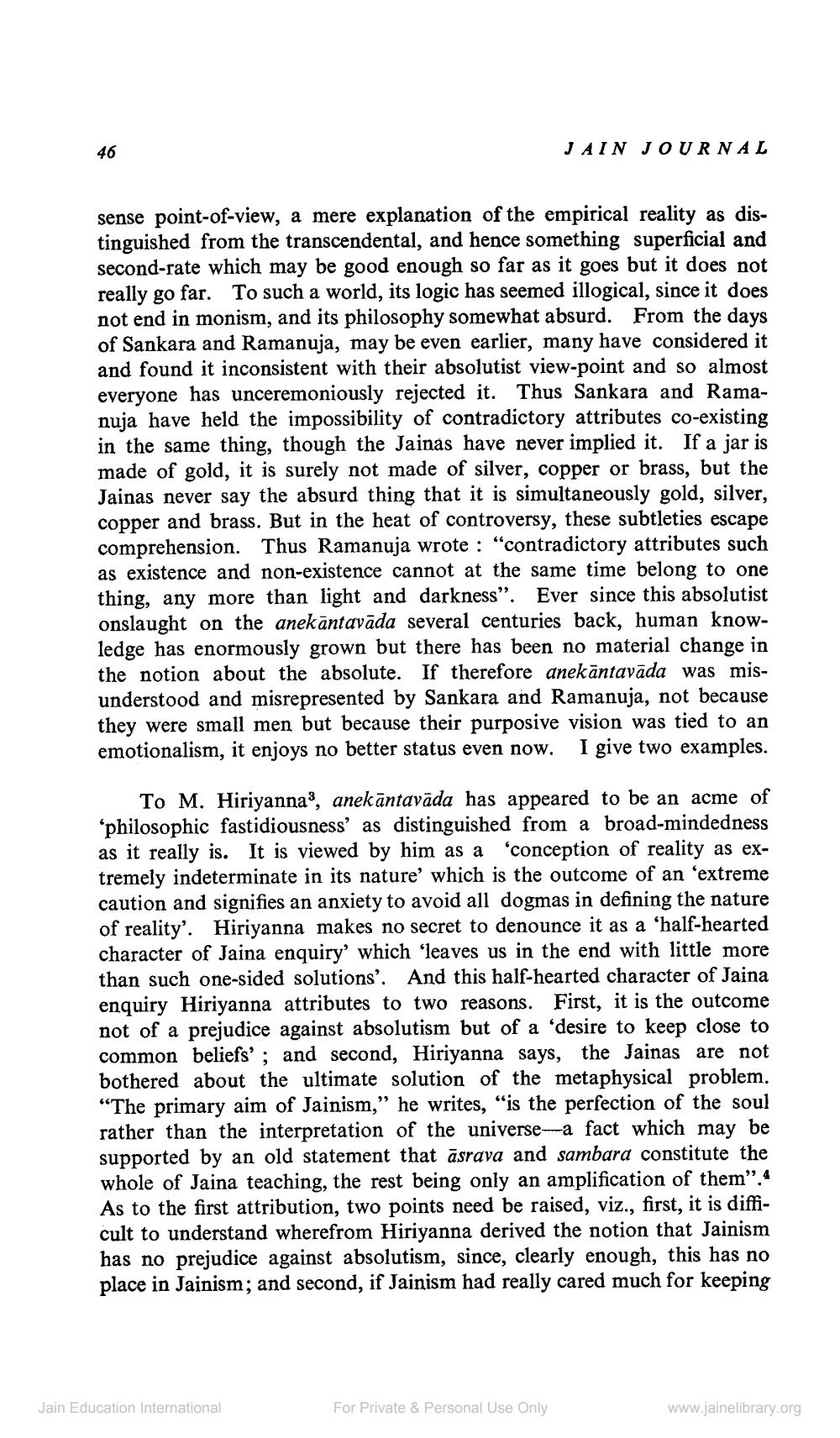Book Title: Jain Journal 1966 10 Author(s): Jain Bhawan Publication Publisher: Jain Bhawan Publication View full book textPage 6
________________ 46 sense point-of-view, a mere explanation of the empirical reality as distinguished from the transcendental, and hence something superficial and second-rate which may be good enough so far as it goes but it does not really go far. To such a world, its logic has seemed illogical, since it does not end in monism, and its philosophy somewhat absurd. From the days of Sankara and Ramanuja, may be even earlier, many have considered it and found it inconsistent with their absolutist view-point and so almost everyone has unceremoniously rejected it. Thus Sankara and Ramanuja have held the impossibility of contradictory attributes co-existing in the same thing, though the Jainas have never implied it. If a jar is made of gold, it is surely not made of silver, copper or brass, but the Jainas never say the absurd thing that it is simultaneously gold, silver, copper and brass. But in the heat of controversy, these subtleties escape comprehension. Thus Ramanuja wrote: "contradictory attributes such as existence and non-existence cannot at the same time belong to one thing, any more than light and darkness". Ever since this absolutist onslaught on the anekantavāda several centuries back, human knowledge has enormously grown but there has been no material change in the notion about the absolute. If therefore anekantavāda was misunderstood and misrepresented by Sankara and Ramanuja, not because they were small men but because their purposive vision was tied to an emotionalism, it enjoys no better status even now. I give two examples. JAIN JOURNAL To M. Hiriyanna3, anekāntaväda has appeared to be an acme of 'philosophic fastidiousness' as distinguished from a broad-mindedness as it really is. It is viewed by him as a 'conception of reality as extremely indeterminate in its nature' which is the outcome of an 'extreme caution and signifies an anxiety to avoid all dogmas in defining the nature of reality'. Hiriyanna makes no secret to denounce it as a 'half-hearted character of Jaina enquiry' which 'leaves us in the end with little more than such one-sided solutions'. And this half-hearted character of Jaina enquiry Hiriyanna attributes to two reasons. First, it is the outcome not of a prejudice against absolutism but of a 'desire to keep close to common beliefs'; and second, Hiriyanna says, the Jainas are not bothered about the ultimate solution of the metaphysical problem. "The primary aim of Jainism," he writes, "is the perfection of the soul rather than the interpretation of the universe-a fact which may be supported by an old statement that asrava and sambara constitute the whole of Jaina teaching, the rest being only an amplification of them".4 As to the first attribution, two points need be raised, viz., first, it is difficult to understand wherefrom Hiriyanna derived the notion that Jainism has no prejudice against absolutism, since, clearly enough, this has no place in Jainism; and second, if Jainism had really cared much for keeping Jain Education International For Private & Personal Use Only www.jainelibrary.orgPage Navigation
1 ... 4 5 6 7 8 9 10 11 12 13 14 15 16 17 18 19 20 21 22 23 24 25 26 27 28 29 30 31 32 33 34 35 36 37 38 39 40 41 42 43 44 45 46 47 48
